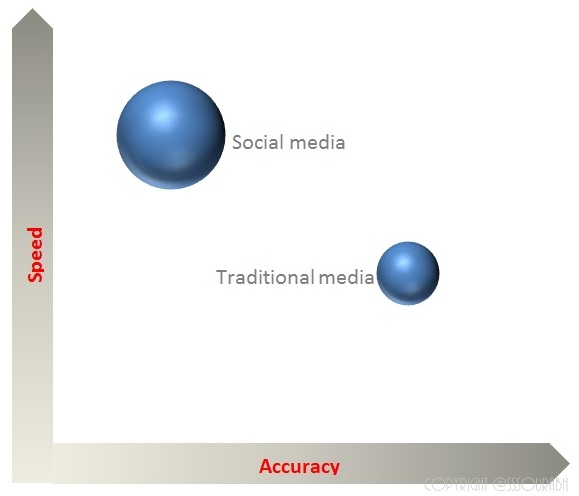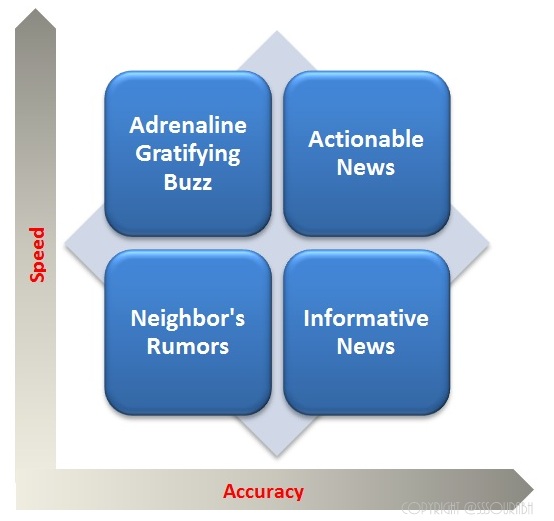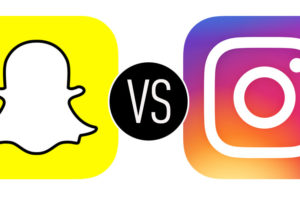News via Social Media: A Speed Vs. Accuracy Paradox
How many times do we see trending topics on social media before hearing them from validated and verified sources? Traditional media and mediums like radio and television are often not the first thing we turn to to hear the news. Especially when a disaster strikes: be it a weather emergency, a natural disaster, a planned attack, a situation of high crime, or anything that classifies as news. Unfortunately, only when calamity strikes is when we realize the Dr Jekyl Mr Hyde effect of social media as a news platform. Despite the rise of Periscope as a reliable and raw equivalent to news footage, here are some lessons from social media as a news feed, and why its two-faced prophecy simultaneously enchants and boggles the world.

Enlightenment via going viral
You have to admit, the news travels fast. Within seconds people know what is going on, and even sans details, a crisis and its reactions are immediate to buzz through twitter and Facebook feeds, adding a layer of personality and a texture of opinion to the breaking news that rips plasma screens. And for that, we should be thankful, for whenever social media is rightfully abuzz , its a matter to consider. Ultimately, the good thing is that people are in the know-how, immediately roped in, and enlightened instead of oblivious.
Bonding over mass voicepower
There are umpteen warming stories on how randoms that would not have otherwise met come together to form either a safety group, offer encouragement, use social media to create groups of protest, which only magnify with virality. When used aptly, the power of multiple voices can truly be well unleashed. As some put it, there’s no better medium than Facebook to call people.
Evidence matters
The fact that surveillance proves to be so valuable is obvious in times when police ask the iPhone clicking and camera gaping spectators for input. Even Vine, launched in fashion events to capture the runway, proved to become a news channel, alongside twitter and Facebook and Reddit, all of which provided visuals that brought the news very immediately, very personally alive.
The race to be first
Media outlets love the notion of being first to hit the planet with a breaking sliver of news on a large canvas of story. Which is why you often see speed at the expense of verification. With crime cases, many facts are unleashed falsely at the onset, and then corrected on noting errors, but losing the faith of those tuning in. More recent news features get more detailed as time progresses, evoking the notion that perhaps waiting will give you a better return on your time for news intake. While news eaters and nail biters eagerly await to hear developments, the notion that these could be false are not appetizing. And the sad thing is, it trickles down to the point of being farcical.
Dirty laundry in public
While everyone is entitled to an opinion, its always more gratifying to see someone take their opinion and take action beyond just phrasing it on twitter or Facebook or making it viral on Reddit. So when prolific personalities chime in or sorrow, surely they can add some actionability to their thoughts, even if by words, to empower others. Alternatively one sees lots of public bashing and expressions of giving up, or very obvious comments of ignorant hatred. Fiery emotions are obviously immediately evoked, but neither reaction particularly helps a situation. Empathy is definitely needed but only goes so far if there is no subsequent step taken towards improvement.
The political aftermath
And obviously everything involves politics. We must truthfully owe some of this partially to the social media spread of information and sentiment that has echoed globally. The slow speed of this, and the consequential continuance of crime however, is tragic. However, it is also true that political unrest ensues due to the world crime events, big and small, with media covering their edged plight on social networks too. Of course, how does it even matter when politics should be about public safety, and not a public debate on the outcome on communities in the population? Not to mention, the inevitable spillover effect on immigration laws. Social continues to play an ironic role in instigating it all.
A languishing fad
Like everything else in social media, hype is short lived. Inevitably, and hopefully with a triumphant ending, the stories will languish with ones of what people eat and what they do and what they believe is the quotable quote of the millisecond. So social media outrage perhaps has no correlation with actual action in the flesh (read as conviction). Not saying that traditional news keeps up with the hype, but at least there is a balance of information versus a waterfall of social news followed by a drought.

The speed vs accuracy paradox
For all the volume that social media relays as news, does it live up to the accuracy of traditional media (read as verified sourced news)?
Naturally, news that is speedy and accurate is immediately actionable, and unarguably, people finding loved ones, updated country regulations, tweets and coalitions formed online are all instantly helpful and fall into this segment. However if news is speedy but lacking accuracy, these simply evoke anxiety, simply gratify adrenaline and add to the voluminous, magnifying buzz. Conversely when news is accurate but does not reach us in time, it may be laced with details, but simply becomes informative, almost supplementing the adrenaline packed news. And news that is neither speedy nor accurate simply trickles down to a neighbor’s rumor.
Which news feed would you channel into?





